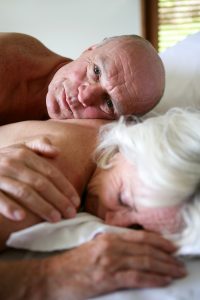Better Sleep for the Elderly
Better Sleep for the Elderly
Insomnia is common in the elderly. Half of elderly adults state they sleep poorly. They often get hooked on sleeping pills. Yet, sleeping pills can be harmful, especially for the elderly.
Problems associated with sleeping pills include:
1. Memory and concentration difficulties
2. Falls and fractures
3. Addiction to sleeping pills (so they have withdrawal symptoms and worse sleep if they try to get off the sleeping pills)
4. Daytime sleepiness and fatigue
5. Mood changes
6. Abnormal behavior during sleep
What the elderly should do to sleep better:
There are many things the elderly can do, that will help them sleep better. These include:
1. Spending no more than 8 hours in bed (including time spent awake in bed)
2. No TV, computers, smartphones in the bedroom
3. A dark and quiet bedroom
4. No pets in bed (pets in the bedroom are OK, just not in bed)
5. Comfortable bedroom temperature
6. Regular sleep habits, going to bed and getting up at the same time every day
7. Avoiding caffeine and alcohol in the late evening
8. No naps
9. Stay active during the day
10. Accept that older adults normally have more brief awakenings at night, and may not sleep through the night like they did when they were younger
Medicines for poor sleep
If poor sleep continues despite good sleep habits and the proper (not excessive) time in bed, then medicines can be helpful. There are medicines (off-label) that decrease the activity of chemicals that keep us awake. They include some old anti-depressants that are very effective for insomnia in doses smaller than those necessary for antidepressant activity. Their use is not without controversy, but they are not addicting, and may be less likely to cause falls. However, most elderly adults will not need medicines if they will practice good sleep related behavior.










